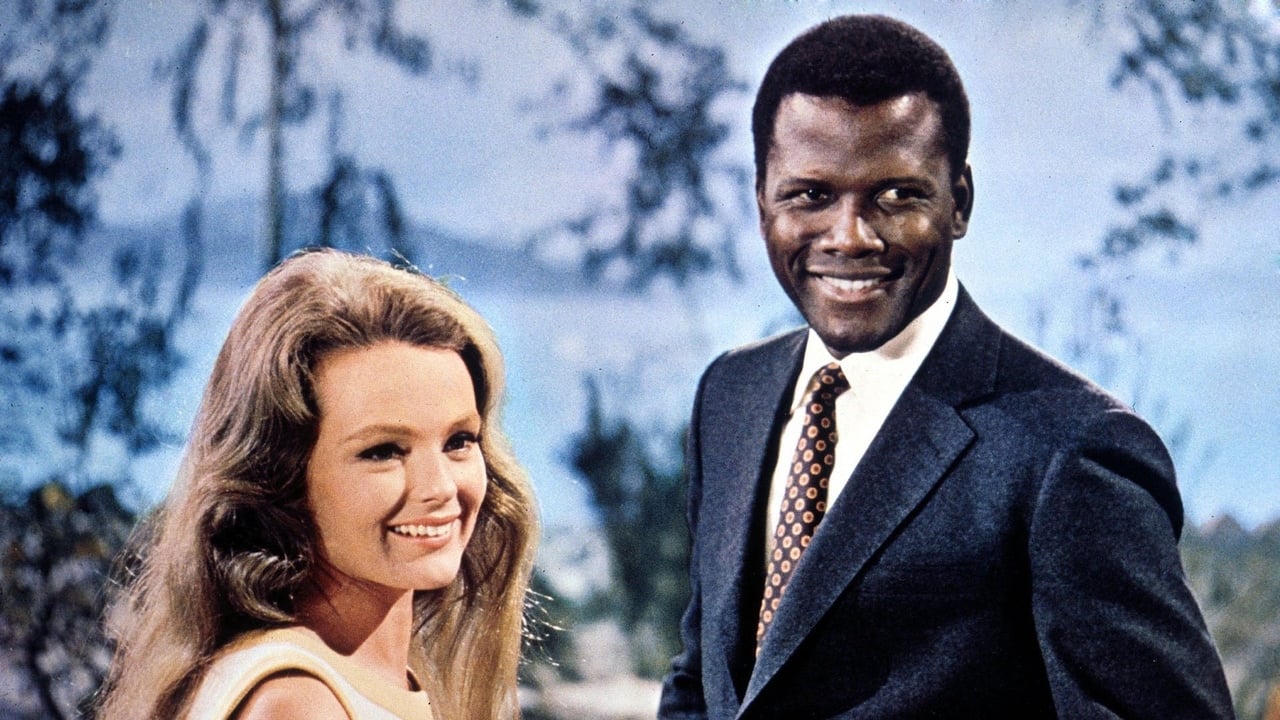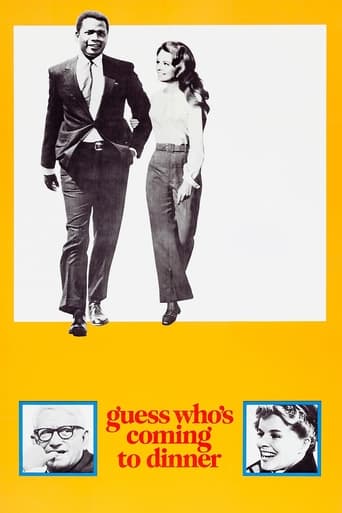

It is a performances centric movie
... View MoreAdmirable film.
... View MoreWhile it doesn't offer any answers, it both thrills and makes you think.
... View MoreA movie that not only functions as a solid scarefest but a razor-sharp satire.
... View MoreEven after 50 years, there are still many takeaways from Guess Who's Coming to Dinner that stand out. The daughter of a wealthy white family bringing home her African-American fiancée is certainly more widely accepted today than it was in the 60s, but the cultural opinions on the subject aren't vastly different between 1967 San Francisco and the some parts of the South today. The reactions of her family are very telling, they are shocked, but the only person truly offended is Tillie, their African-American maid. Her prejudices are more intense towards her own race, then the views of any of the white characters. Everyone's real desire is to maintain the status quo, and it takes a lot to get them to move past that and embrace a relationship that upends that.The entire cast excels, particularly Spencer Tracy as the father trying to do what's best for his daughter and Katharine Hepburn as the supportive mother. Beah Richards also is very strong as Mrs. Prentice, another mother seeing the love between them are realizing it is stronger than any of the difficulties they will assuredly face.
... View MoreWhen Katharine Houghton returns home to San Francisco from a ten-day Hawaiian cruise, she's deliriously happy. She's fallen in love, wants to get married, and has brought her intended home to meet her parents, Katharine Hepburn—her aunt in real life—and Spencer Tracy. On paper, everything's perfect. He's a doctor, a humanitarian, morally respectful, and in love with their daughter. When they meet him, though, Kate and Spence are a little surprised. Their daughter wants to marry Sidney Poitier, and while they raised her to be as color-blind as possible, they're not particularly thrilled that she's chosen to marry a black man in the 1960s.If you haven't seen Guess Who's Coming to Dinner, you're missing out on an iconic piece of American cinema. It was nominated for ten Academy Awards, taking home the gold for Best Actress and Best Screenplay, and it's one of the most defining films of the decade. While Sidney Poitier was universally ignored for this film during the awards season, and for the other famous film he made that year, In the Heat of the Night, his role and performance were etched in film history. There's a line Sidney says after Spencer voices his concerns about the difficulties of raising bi-racial children, and at the time it was merely considered cute and full of wishful thinking: "Johanna feels that all of our children will be President of the United States. . . I'd settle for Secretary of State." Watching the film now gives that line an entirely different meaning.While all the performances in the film are wonderful, watching Katharine Hepburn and her longtime love Spencer Tracy is bittersweet. In their ninth film together, Spence's health was failing drastically. He died seventeen days after filming completed, and Kate never saw the finished product because it would have been too painful. He gives a very famous speech about true love that brings tears to the audience's eyes, not only because it's a well-written speech, but because it's clear he's speaking about his on screen and offscreen partner.Each character has his or her own fondly remembered lines and speeches in the film: Kate's unforgettable recitation of the title; Spence's Oregon boosenberry ice cream scene and "that's everything" monologue; Sidney's "get off my back" speech; Katharine's "Isn't it just!" exclamation; and Isabel Sanford's line that proves she's clinically blind, saying Sidney Poitier isn't good-looking. I remember watching this movie as a kid, not understanding why anyone would have a problem welcoming Sidney Poitier into the family, and of course being terribly jealous of Katharine Houghton. I've had a crush on him ever since, but whatever reason you watch the film, for the Americana, acting, writing, or eye candy, I'm sure you'll enjoy it.
... View MoreI'm going to speak frankly.As a person who is by no means a leftist or a liberal, I found this film to be very moving. Most people who review the film I assume are liberals, so I guess I offer a different perspective. For me, this is a sad film. It is sad because the vision of America that the liberals Tracy and Hepburn's characters have here just did not pan out. The moment when Poitier's character says "you see yourself as a colored man, but I see myself as a man" shows just what sort of society these people imagined we would have, and it's tragic that history did not turn out that way. From the vantage point of 2017, race relations are worse than ever before. With SJWs, Affirmative Action, crime in the inner cities, anti-white racism, immigration problems etc, the vision that race would no longer matter just simply did not pan out. As whites today this film can only make us sad. It's tragic. I almost wish things did turn out that way, that race in America could have become a nonfactor and that none of the crazy problems we face today exist, but they do. And so viewing this film in retrospect, it seems so innocent and naive in a tragic way. Beautifully filmed with a San Francisco location and a lovely soundtrack, this is by all means a tremendous film, and I probably like it a little more than snotty liberals who probably can find this or that reason to view this film which to me seems progressive as "reactionary."
... View MoreWith three huge hits in 1967, Sidney Poitier claimed his reign as the biggest star in Hollywood, over Redford, over Newman, over McQueen. No actor took on such films with social consequence and won both scorn and admiration for it. Controversy loomed because white audiences loved him, and for some black moviegoers considered him an "Uncle Tom". But if only a handful of bigoted white people came out of seeing a Sidney Poitier movie seeing an actor and a man rather than a black actor or a black man, then he made just as much headway in the civil rights movement as the marches did.Coming out just as the supreme court legalized interracial marriage, thus tackles the subject head on. Perhaps its too polite, too upper middle class, too clean cut, but there it is, an attempt to tackle a topical subject, and it opened a conversation where the answers are completely all over the map today.The beautiful Katherine Houghton comes home with a surprise for her "nice" parents, Spencer Tracy and Katharine Hepburn, decent people but stunned by the news. Actually, Hepburn is more open to the idea, as earthy and understanding as husband Tracy is old school. When Poitiers's parents arrive, the discussion comes to a head, and like Hepburn, Poitiers's soft spoken mother (Beah Richards) is more open to the idea than Poitiers's frightened father (Roy Glenn) who is old fashioned elegance and proud, but locked in old ideals.Isabel Sanford, as Tracy and Hepburn's housekeeper, represents the outsiders point of view from the black angle, while Virginia Christine is the uppity white person's point of view, deliciously told off by Hepburn. Grwsr moments in the script often make thus feel too "plotted" in every deal, with few awkward moments to represent the real life. But certain moments, such each of the major character's individual speeches (highlighted by Richards and Tracy's climactic viewpoints) are each brilliant in their own way. It's emotional to watch Hepburn and Tracy working together for the very last time, so being manipulated by the sentimentality can take over the soul while watching it. Still, as directed by the legendary Stanley Kramer, it comes out to be an important historical document on race relations, although in some aspects, it seems quite dated.
... View More